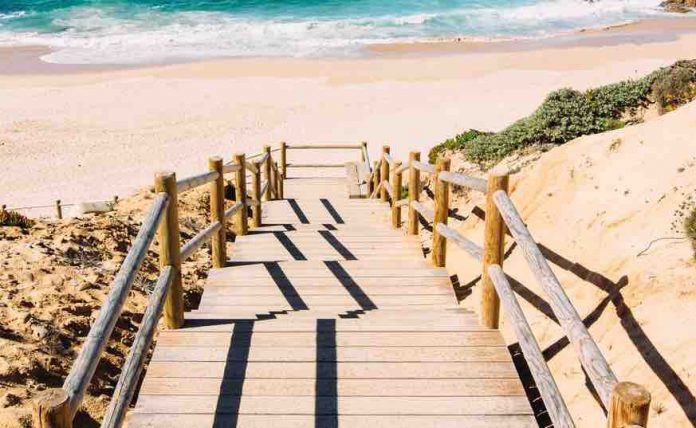The decision to travel to amber list countries is a “personal responsibility”, a minister has said.
But skills minister Gillian Keegan echoed the PM’s warning yesterday that they are “not somewhere where you should be going on holiday”.
Thousands of people have reportedly travelled to destinations on the amber list since the ban on foreign holidays was lifted on Monday.
More than 150 flights are reported to have left on Monday to places such as France, Greece, Spain and the US.
Amid confusion over the government’s position on holidays, Boris Johnson said yesterday that travel to amber list countries had to be for “some pressing family or urgent business reason”.
Asked about travel to amber list countries this morning, Ms Keegan told Sky News: “This is the time for cautious personal responsibility… The British public have been amazing both in getting the vaccine and… adhering to all the lockdown rules… But… this first step is the first step in the next stage of the journey. And we think it’s the right step.”
On the amber list, she added: “This is guidance from the government. We haven’t legislated to ban people from going on holiday.
“And, as with many of these things that we’ve had throughout the pandemic, this has been about really relying on the great British public to be sensible and looking at the guidance that we put in place and taking their own decisions.”
But she cautioned: “We wouldn’t advise going on holiday to the amber list countries.”
EU ambassadors, who met on Wednesday, are understood to have backed plans to allow fully vaccinated UK holidaymakers to visit the bloc for non-essential travel this summer.
The confusion left many in the travel industry expressing frustration, especially as Foreign Office (FCDO) guidance appeared to indicate that people were safe to visit many of the countries on the amber list.
George Morgan-Grenville, founder and chief executive of travel company Red Savannah, said the industry was “facing a disaster” and she couldn’t understand why it “has to bear the brunt of so much confused and mixed messaging from ministers”.
A statement from TUI said: “We want to offer our customers flexibility and choice this summer, so where borders are open and FCDO advice allows travel, we will operate to those destinations. We know some customers may be unsure about travelling this summer, so we’ve offered free changes 14 days before travel for anyone due to travel before the end of August.”
A spokesperson from Hays Travel added: “Hays Travel always follows government advice and we will only book holidays for our customers to destinations that are allowed according to the FCDO published guidance.
“There are some amber destinations that are allowed and in these cases we are ensuring our customers are fully informed with the best and most up to date advice so that they are aware of any requirements or restrictions from FCDO and the destination country.
“Flights or holidays to countries that are not allowed currently may appear on our website, however they cannot be booked either on line or by phone for dates where restrictions are in place.”
On Tuesday, when asked why the government the day before had dropped £5,000 fines for people found to be going on holiday to amber list countries, the prime minister’s spokesman said England was moving to a different stage of the epidemic, one in which people should take personal responsibility for their actions.
The PM’s spokesman said: “We are working with the travel industry and others on this. All of us have a personal responsibility to protect one another as we cautiously reopen international travel.
“That is why it is important when proceeding to go on something like a holiday people stick to the green list.
“We are moving to a situation where the public can take responsibility for their actions. I think it is important to stress that by and large that is what we are seeing.”
A health minister risked sowing confusion when he indicated in the House of Lords that people should not be going abroad full stop.
“Travelling is dangerous. That is not news to us or to the people who get on those planes in the first place,” Lord Bethell said.
Shadow health secretary Jonathan Ashworth said the government was wrong to have allowed travel at the start of the week.
He told Sky News: “People just want clear guidance about what is the right thing to do. I probably wouldn’t have introduced… the international travel restrictions easing, this week. I’d have done it in a different way.
“Our shadow home secretary, Nick Thomas-Symonds, has long been calling on your programme and other programmes that we need a comprehensive border policy.
“Our borders have been as secure as a sieve throughout this crisis – it’s why we are seeing these variants bounce across the world and come and hit us and there’s probably going to be more of this as well.”
His comments come amid criticism the next lockdown easing stage on the road map, 21 June, has been put at risk due to the rise in cases of the Indian variant of concern.
Cases of the variant, also called B.1.617.2, have doubled in the UK in the last week – particularly in key areas – after it was first thought to have entered the UK via travellers from the sub-continent.
Imperial College London epidemiologist Professor Neil Ferguson, a member of the Government’s Scientific Pandemic Influenza Modelling Group (SPI-M), told BBC Radio 4’s Today the fact that the Indian variant had managed to enter the country showed the quarantining system hadn’t worked.
He said: “I think one thing the import of this Indian variant has shown us – everybody coming back from India had to home quarantine, had to test – is an imperfect way, it basically didn’t work.”







